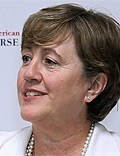SAN ANTONIO — A rule that would give advanced practice registered nurses working in the Veterans Affairs (VA) system "the ability to operate with full practice authority without the clinical oversight of physicians," regardless of local or state restrictions, is being advocated by the US Department of Veterans Affairs.
A panel of four members of the San Antonio American Legion expressed support for the rule during a news conference here at the American Association of Nurse Practitioners (AANP) 2016 National Conference. They said they are confident in the ability of nurse practitioners to provide quality care.
"Veterans are waiting for 30 days or more to get the healthcare they deserve, which is far too long," said AANP President Cindy Cook, DNP.
"Today's nurse practitioners show outcomes equivalent to or better than their physician counterparts. They can order and interpret tests, make diagnoses, and prescribe medications," she explained. "It's time to make this care more readily available to veterans and honor veterans and heroes with the high-quality healthcare they deserve."

Dr Cindy Cook
Dr Cook takes issue with the assertion of the American Medical Association that physicians should be heading healthcare teams for Veteran Affairs, not nurse practitioners, as reported by Medscape Medical News. Nurse practitioners have a 50-year proven track record and have proven time and time again that they can provide high-quality care, she said.
"Patients need to make the decisions about who's the head of their team," Dr Cook said. "Patient needs can change from time to time," she explained. "It's time nurse practitioners provide the care that they are totally educated and clinically trained to provide."
Lloyd Buckmaster, who is American Legion 20th District Commander in San Antonio and former physician assistant, pointed out that "nurse practitioners are not a threat to doctors; they are not trying to take doctors' jobs. This just means that patients won't have to wait 30 days to be seen."
Wait times are way beyond the scope of what's reasonable, Buckmaster argued, noting that prisoners get better access to care in the United States than veterans.
"I've worked in prisons as a physician assistant and if I had made one of those people wait 30 days to be seen, I would have had a lawsuit against me. The law says you have to see them within a week," he explained.
But "we don't have that kind of regulation for our veterans," he said. "When Robert A. McDonald, Secretary of Veterans Affairs took over, we thought it would change, but it hasn't."
Last year, it took at least 1 month for a veteran to be seen, according to a VA audit. And now there are 70,000 more appointments than there were a year ago.
The proposed rule is not going to create a change in medical care, but Buckmaster said he is sure it will alleviate wait times. "When I go in as a retiree, I can sign up for a primary care provider and choose between a physician, a nurse practitioner, or a physician assistant," he told Medscape Medical News. The rule would simply mean more nurse practitioners would be available from the pool of frontline caregivers.
Currently, there are 4800 nurse practitioners at VA facilities. Some of them provide clinical assessments, order and interpret diagnostic tests, make diagnoses, initiate and manage treatment plans, and prescribe medications, but not all of them do.
No matter where in the VA system nurse practitioners work, they are bound by individual state licensure, which can restrict their ability to perform services, such as writing certain prescriptions.
The proposed rule would put all nurse practitioners working in the VA system on a level playing field, with no practice restrictions.
"If you compare it to having a driver's license, it would be like saying certain drivers can't make right hand turns in a certain area," said Tay Kopanos, DNP, AANP vice president of state governmental affairs.
"That type of restriction clogs up the system. Letting nurse practitioners practice to their full potential will certainly clear up some of the backlog," she said.
Nurses Already Providing Primary Care
There are currently more than 222,000 licensed nurse practitioners playing a major role in the provision of care to rural, underserved, and uninsured populations in the United States.
Nurse practitioners are most likely to focus on primary care, no matter what setting they are in, according to a 2016 nurse practitioner sample survey.
But in primary care, privileges vary. The survey showed that of nurse practitioners with hospital privileges, 73.0% said they could write orders without a physician cosignature, 41.1% had to write prescriptions with a physician cosignature, 58.9% could discharge patients, and 53.5% had admitting privileges.
Under the proposed rule, nurses would have 100% privileges.
"I'm appalled when I see how long it takes for a veteran to get primary care," said retired Lt Colonel Alicia Rossiter, who is program director of V-CARE at the University of South Florida in Tampa. "I am deeply moved by my colleagues and physicians in the VA who are devastated that they have to be in a system where patients wait so long. This proposal that the VA has put forward is superb. We are absolutely prepared for it."
American Association of Nurse Practitioners (AANP) 2016 National Conference. Presented June 23, 2016.
Medscape Medical News © 2016 WebMD, LLC
Send comments and news tips to news@medscape.net.
Cite this: Nurses, Veterans Back Independent Practice to Cut Wait Times - Medscape - Jun 27, 2016.








Comments